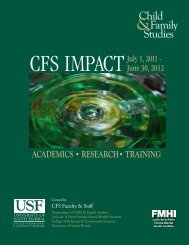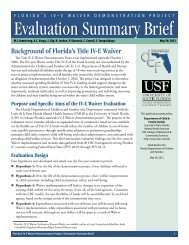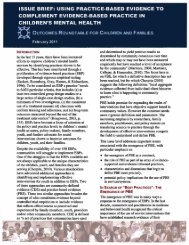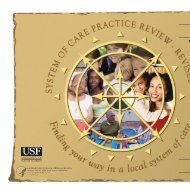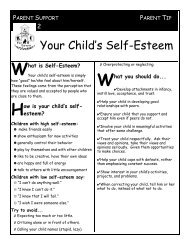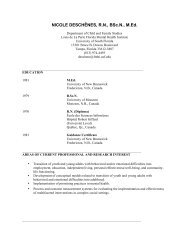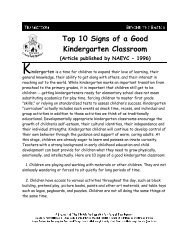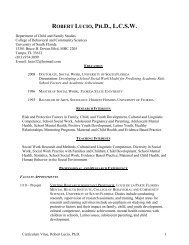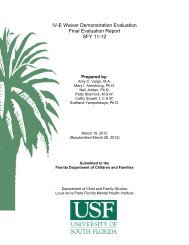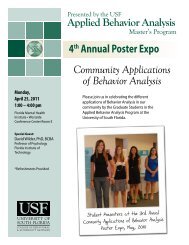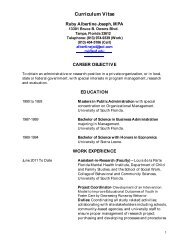The Early Learning Opportunities (ELO) Act - Child & Family Studies
The Early Learning Opportunities (ELO) Act - Child & Family Studies
The Early Learning Opportunities (ELO) Act - Child & Family Studies
You also want an ePaper? Increase the reach of your titles
YUMPU automatically turns print PDFs into web optimized ePapers that Google loves.
Evaluation of the <strong>Early</strong> <strong>Learning</strong> <strong>Opportunities</strong> <strong>Act</strong><br />
Question<br />
7<br />
What Are the Factors Associated With Efficient<br />
Implementation Of This Model in the Community?<br />
Implementation of the grant includes the HUR! Course, the coaching component, and the<br />
social/emotional component. As the HUR course was conducted through an official course at<br />
the St. Petersburg College, the program was efficiently implemented by the university<br />
standards. <strong>The</strong> other two main components will be discussed in this section. For coaching, a<br />
summary of the time spent implementing the coaching facet of the grant will be discussed. Next,<br />
an analysis of whether the content of the coaching sessions aligned with the <strong>Early</strong> Literacy and<br />
<strong>Learning</strong> Model (ELLM) of early educator coaching will be provided. Finally, the social/emotional<br />
component included home visiting and parent education sessions. For the home visiting<br />
component, please refer to Table 6 for a review of the services provided. <strong>The</strong> Parent Education<br />
facet will be discussed in this section; a review of dates, topics, and number of participants in<br />
the Parent Education workshops will be presented.<br />
Summary of Coaching <strong>Act</strong>ivities<br />
To determine the factors required to implement the coaching component, the coaches’<br />
services were categorized by direct and indirect service. Direct service included classroom visits<br />
for the literacy coaching sessions (LC). <strong>The</strong>se sessions were face-to-face sessions with the<br />
teacher for about one hour. While participating in the HUR course, <strong>ELO</strong> teachers in the<br />
coaching condition received an average of 7 and 4.5 LC sessions, respectively for the spring<br />
and summer cohorts. <strong>The</strong> difference in the numbers is because the summer session was<br />
considerably shorter (10 weeks compared to 15 weeks).<br />
Indirect service includes any preparation activities related to coaching, such as laminating<br />
reading materials, writing notes from the visit, driving to the visit, and researching ideas for<br />
teachers. As it would have been too time consuming to record every indirect service activity, the<br />
coaches estimated that they spent 12 hours/week on these activities. As they participated in the<br />
grant for 69 weeks, the total was 828 hours per coach for the duration of the grant. A summary<br />
of the total number of sessions and total numbers of hours spent in direct and indirect service<br />
during and after the HUR! Course is presented in Table 16.<br />
Table 16<br />
Summary of Coaching <strong>Act</strong>ivities for Three Coaches<br />
Total Hours Coaching:<br />
Direct Service<br />
Total Hours<br />
Coaching:<br />
Indirect Service<br />
Total Hours<br />
Coaching<br />
Indirect and Direct<br />
Total Number Coaching<br />
Sessions (LC)<br />
1,637 hrs + 2,484 hrs = 4,121 hrs 1,644 sessions<br />
As a total of 4,121 hours were spent providing coaching service, and there were a total of<br />
128 teachers who received coaching, the average number of hours per teacher was 32 and<br />
average sessions was 12.8.<br />
Review of Literacy Coaches’ Session Notes<br />
In order to document alignment with the ELLM coaching model (Fountain, 2002), which<br />
provides a framework for coaching that cycles through observation, feedback, modeling, and<br />
goal setting, a review of notes completed by LCs and signed by their respective teachers<br />
Louis de la Parte Florida Mental Health Institute, University of South Florida – page 30



